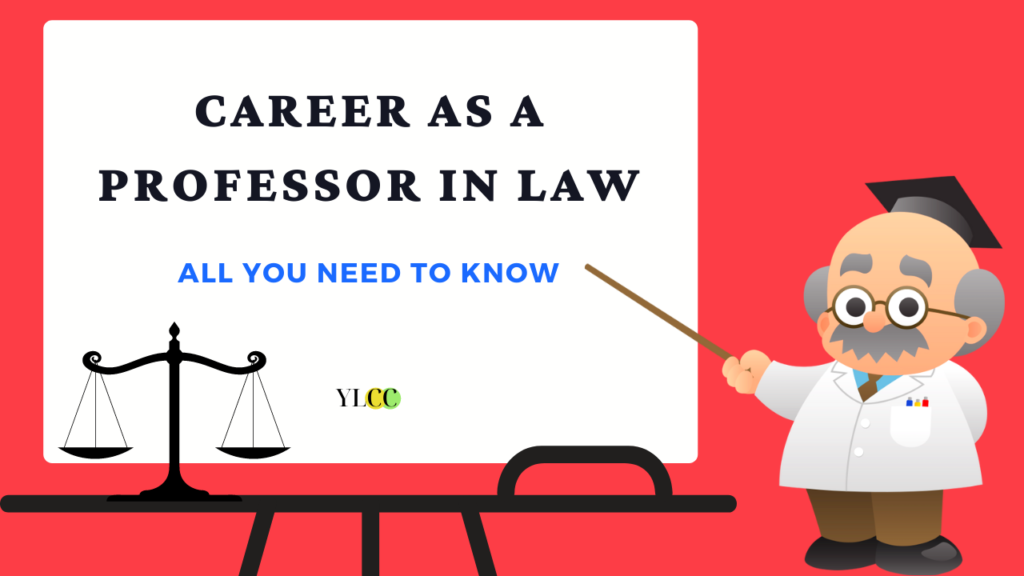
INTRODUCTION
Having lived through the COVID-19 pandemic, we now realize that there is no perfect formula for imparting education. We have seen a radical change in the way we view teaching, learning, and interaction as a result of the shift away from offline to online education. The on-screen engagement was not simply shifted to online teaching, but newer ways were invented to keep students intrigued and engaged.
Additionally, law schools are actively involved in providing online education, carrying on the tradition of nurturing aspiring minds. The role of law teachers is crucial in fostering a culture of academic freedom at their institutions and opening the minds of future agents of justice. Bar and Bench shall remain in their hands for generations to come.
If you choose to become a law professor, you will be able to teach the complexities of the law to fellow students at universities. Faculty members teach students about the philosophy of law, legal ethics, and legal practices. Being aware of what a law professor does daily and taking the steps necessary to become one can help you prepare for an effective teaching career.
In this article Team YLCC gives you an overview of a career as a law professor in India. Read on!
ROLE OF A LAW PROFESSOR
Students learn how to apply the law in the real world from a professor with extensive experience in the law, its philosophy, and its application. Professors are usually employed by private colleges, universities, or law firms.
The following can be the responsibilities of the law professors, regardless of the institution where they work:
1. COLLECTIVE KNOWLEDGE: Law professors contribute to studies and publish research papers to improve the collective knowledge of the legal industry about the law and its applications.
2. INTERPRETATION: A law professor interprets legal concepts for students and explains what they mean. Students can make ethical decisions based on a better understanding of complex legal documents.
3. PRACTICAL INSIGHTS: Students are taught how the law applies to society as well as to governments, organizations, and individuals. Furthermore, they are also taught how and why legal statutes are enacted.
4. STRUCTURE OF THE COURSES: During law school, students are assigned coursework to complete and are graded on those assignments. Homework, exams, and research papers are common types of assignments, which are given by professors.
5. OTHER ROLES:
- Be in charge of grading and evaluating students’ assignments, papers, and oral presentations.
- Compose, administer, and grade exams, or entrust this work to others.
- Read current literature, talk to colleagues, and attend professional conferences to stay informed about developments in the field.
- Present lectures on civil procedure, contracts, and torts to students at the undergraduate or graduate level.
- Ensure that attendance, grades, and other necessary records are maintained for each student.
- Discussions in the classroom are initiated, facilitated and moderated.
- Students are advised and assisted during regular office hours.
- To publish findings in periodicals, books, or electronic media related to a particular area of knowledge.
- Take on administrative responsibilities, such as serving as a department head.
PATHS FOR LAW PROFESSORS
A career in law teaching can take one of three paths mentioned below. Though not all, most law teachers enter the profession through one of the following paths:
1. PATH 1ST:
Classical Pathway begins with outstanding academic performance in law school, for example being an Articles Editor or an Editor-in-Chief, and a distinguished judicial clerkship in the Supreme Court, if possible.
Considering how intensely competitive law professorial job markets are, it is no longer a guarantor of a good law-school teaching job. Also, in recent years, more and more legal academics have started questioning whether these are the qualifications that should be sought in an aspiring law teacher and legal scholar.
Several schools, from law & economics to empirical legal studies, have also shifted their focus to interdisciplinary studies and programmes, thus making the classical path less relevant. Therefore, today, many people who a generation ago would have chosen the Classical Path are also pursuing Paths 2nd and 3rd (mentioned below).
2. PATH 2ND:
In comparison with the Classical Path, the LLM or any similar degree may require less academic experience and related work experience, for example, strong grades, but not exceptional ones, some work on a journal, or some substantial writing experience, but not necessarily via law review, some practical experience in the field, such as an internship or a clerkship.
It is true that these credentials alone, in conjunction with a strong interview, will sometimes get you hired at an institution where hiring is not as competitive, but hiring is increasingly competitive in almost every school.
For Path 2nd, you may need more academic experience/research after graduation from law school, perhaps after gaining practice experience. This can be accomplished by earning a graduate legal degree (an LLM) at an elite law school. Providing legal research and writing courses at a top-of-the-line law school that recruits applicants for such positions to develop them as legal scholars and law teachers can also work.
The job may also involve working as a Visiting Assistant Professor (VSP) or Fellow in one of the numerous programs offered by top law schools that are designed to lead to teaching careers.
3. PATH 3RD:
A candidate pursuing the Interdisciplinary Path can also choose to combine it with the above-mentioned paths, though this requirement is not mandatory if the other discipline’s work is of sufficient quality and distinction to catch law schools’ eyes. In this case, a graduate degree candidate also pursues graduate studies in another relevant field, such as history, economics, philosophy, sociology, political science, etc.
HOW TO BECOME A LAW PROFESSOR?
To become a professor of law, you may follow several different paths. Consider learning about financial law and gaining experience in a finance setting if you are interested in math and finance. Alternatively, an aspiring law professor who is interested in helping others lead fulfilling lives could concentrate on human rights law and gain experience via a non-profit organization (“NPO”).
Following these steps can help you become a law professor, no matter what your speciality is:
1. OBTAINING LAW DEGREE:
For aspiring law professors, earning a bachelor’s degree is the first step. A candidate can either pursue a 3 year LLB or a 5-year integrated law programme.
The following are the additional recommendations to do in college if one wants to be a law professor:
- Pursuing internships with NGOs.
- Writing thesis/research papers/research articles on the topic of interest.
- Teaching children, to those in need, or in an institution, to gain an overview of teaching.
2. AIBE EXAM:
For becoming a law professor, it is not mandatory to clear the All India Bar Examination (AIBE). However, it is highly recommended to clear AIBE.
After the completion of the law degree, the candidate is eligible to apply for the enrollment number. Through enrolment number, one is eligible to apply for AIBE.
3. CLERKSHIP:
A legal clerk usually works for a judge. In addition to handling court cases, they complete legal paperwork, conduct research, write bench memos, and assist judges with court matters. Gaining valuable experience working directly with a legal professional is one of the benefits of working under a licensed judge. Aspiring law professors often serve as clerks in a court and then apply for a clerkship in high courts.
4. PUBLISH:
In law school and afterwards, you can engage in legal research and publish your findings in legal publications. Performing research and drafting legal documents are other aspects of working as a legal clerk in a higher court. You can use your professional perspective to interpret laws and cases when you conduct legal research. In addition to developing your credentials as a legal professional and researcher, publishing several research papers can enhance your resume as a professor.
5. PRACTISING:
Immediately following law school and earning your legal credentials, it’s helpful to work independently or at a law firm for three to five years. In this way, you can gain practical experience and learn about the legal profession, which will help you become an accomplished legal professor.
Many universities look for candidates with academic accomplishments as law professor candidates, but experience in the field can help you show your relevant experience to potential employers. As a result of your experience, you can also provide a reliable source of information about working in the legal field to your future students.
6. UGC-NET:
The UGC NET exam is conducted for LLM graduates who are interested in becoming Assistant Professors of Law, Junior Research Fellows, and other such academic titles. The National Testing Agency (NTA) conducts UGC NET twice every year.
This test is open only to candidates who have earned at least 55% marks (without rounding off) in undergraduate degree study in Humanities (including languages) & Social Science, Computer Science & Applications, Electronics Science, etc. from universities/institutions recognized by UGC.
7. MASTERS:
Earning additional degrees can enhance your law professor resume, even if employers do not typically require candidates to pursue additional education. Degrees such as master’s in law and doctoral degrees (PhD Degree) are often needed by potential law professors. A Ph. D degree has become compulsory to promote to the ‘Assistant Professor’ position in colleges from July 1, 2021.
8. APPLY:
A job with a university or private law school is the final step in the process. Develop a resume that showcases your legal experience, your education, and your achievements. Research or publications you have completed can also be included in your statement.
YLCC would like to thank Nikunj Arora for his valuable insights in this article.






